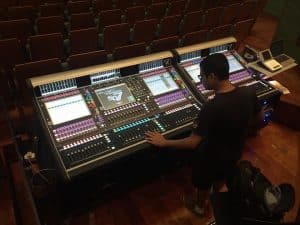Responsibilities of a Live Sound Engineer
A live sound engineer is responsible for setting up, operating, and maintaining the sound equipment used during a performance to ensure that the sound quality of a performance meets the expectations of the performers and event organizers. This involves operating sound equipment, including mixers, speakers, amplifiers, microphones, and other audio equipment. The live sound engineer works closely with the performers to achieve the desired sound and makes adjustments as needed to achieve a balanced and clear audio experience for the audience. In addition, the live sound engineer also plays an important role in troubleshooting any audio-related problems that may arise during a performance.
Skills Needed for Live Sound Engineering
To excel in live sound engineering, a combination of technical knowledge and creative skills is necessary. Technical knowledge of audio equipment, signal flow, and sound reinforcement techniques is essential. A thorough understanding of sound theory and acoustics is also important. Additionally, problem-solving skills are crucial, as live sound engineers often need to quickly resolve technical issues that arise during a performance. A creative ear is also important, as the live sound engineer is responsible for shaping the sound to meet the desired aesthetic. Attention to detail is key, as even the smallest adjustment can have a significant impact on the overall sound. Finally, good communication skills are necessary, as live sound engineers need to work closely with performers and event organizers.
Challenges Faced by Live Sound Engineers
Live sound engineers face a variety of challenges in their work, including environmental factors, technical issues, time constraints, working with different performers, and managing stress. The acoustics of a room and the surrounding environment can greatly impact the sound, and live sound engineers need to adjust the sound system accordingly. Technical issues, such as equipment failure, electrical problems, and audio interference, can arise during a performance, and live sound engineers need to be prepared to quickly troubleshoot and resolve these issues. Time constraints can also be a challenge, as live sound engineers often have limited time to set up and adjust the sound system. Working with different performers can be a challenge, as each performer may have unique sound requirements. Finally, the fast-paced and high-pressure environment of live sound engineering can be stressful, and live sound engineers need to remain calm and focused under pressure to ensure that the performance goes smoothly.
To excel in live sound engineering, a combination of technical knowledge, creative skills, and the ability to work under pressure is necessary. Despite the challenges, live sound engineering can be a rewarding and fulfilling profession for those with the right skills and experience.

